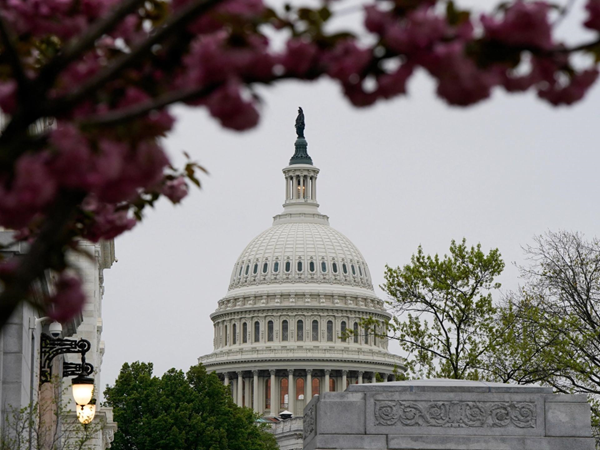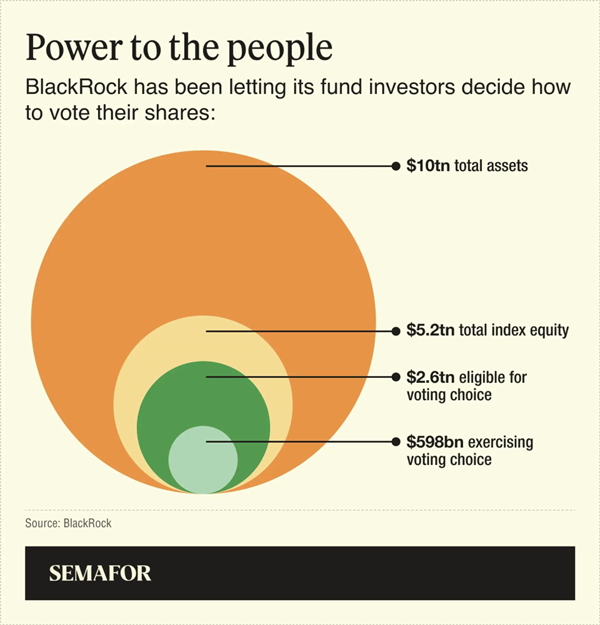
INTELLIGENT §
TRANSPARENT
§
GLOBAL
|
Shareholder adviser Glass Lewis joins political retreat
Liz Hoffman and
Rohan Goswami
Apr 29, 2025, 5:31am EDT
business
|

Elizabeth Frantz/Reuters
|
 The Scoop
The Scoop
For years, two firms have dominated the business of telling investors
how to vote in corporate elections. One wants out.
Glass Lewis, the scrappier and smaller rival of Institutional
Shareholder Services (ISS), is discussing a dramatic shift to
essentially scrap its “house view” on ballot measures ranging from
takeover battles to complaints about gender balance, political
donations, and carbon emissions, according to people familiar with the
matter and an internal memo seen by Semafor. The move is partly in
response to heightened conservative backlash, they said.
Instead, Glass Lewis would help investors develop their own custom
voting policies, handle the paperwork and regulatory reporting, and
provide data and research. The changes would be phased in over a few
years, and the firm would likely continue to make explicit
recommendations in the meantime.
Glass Lewis has angered both corporate executives and conservative
politicians by supporting, among others, ballot measures for
McDonald’s to audit its racial diversity, Starbucks to produce an
independent report on its labor practices, and meatpacker Tyson to
disclose and defend its political contributions.
It also recommended that shareholders reject Jamie Dimon’s $53 million
bonus in 2022, which earned it the unending ire, recently
vented in an interview with Semafor, of the JPMorgan chief. (In a
perfectly timed juxtaposition, ISS on Monday recommended that
BlackRock shareholders vote down CEO Larry Fink’s $30 million-plus pay
package.)
Its pivot reflects a growing desire among players across the financial
industry to get out of the moralizing business and back into the
business of managing and making money. The most visible backpedaling
happened at investment giant BlackRock, which has retreated from its
late 2010s progressive push under a hail of political arrows.
“Speak softly and invest money,” Mark Wiedman, then a top BlackRock’s
executive told Semafor in 2023, about a year into the $11.6 trillion
firm’s change of heart. BlackRock and Vanguard have both dialed
back their requirements that public company boards include women
and minority investors, and rolled out new options for investors to
vote their own shares, rather than adopt BlackRock’s house view.
Other gatekeepers, like Goldman Sachs, a
major IPO underwriter, and Nasdaq have scrapped similar requirements —
the latter after a court
order.
Glass Lewis’ own pivot comes a year into the tenure of its new CEO,
Bob Mann, and amid an investigation by House Republicans into it and
ISS. The two firms control an estimated 90% of the US
shareholder-advice market, which critics say has allowed them to push
an ideological agenda. Glass Lewis’ moves would go beyond those of
ISS, which said in
February that it would no longer consider the diversity of board
members when making its recommendations.
A congressional
hearing is set for Tuesday afternoon.
 Liz’s view
Liz’s view
I’ve always found Republican claims of a vast left-wing conspiracy in
investing a little silly. BlackRock, Glass Lewis, Goldman Sachs, and
Nasdaq are commercial creatures, and they were responding to
commercial pressures in the late 2010s and early 2020s.
The political winds were blowing left, so they went left. BlackRock
was cajoled into joining a climate-change coalition by European and
Japanese pension funds that threatened to pull their money if it
didn’t. Not to say that Larry Fink didn’t believe in diversity, or see
a chance to burnish his own standing by fronting a social movement.
But as I wrote last summer, his
leftward shift seemed “like a CEO tweaking his company’s product
because some important customers stopped buying it.”
Now the customers want something else. Plus, designing and executing
custom voting policies for clients is more profitable for Glass Lewis
than having big ideas of its own, according to people familiar with
the privately held company’s finances. Making more money while getting
yelled at less is a good business model.
 Rohan’s view
Rohan’s view
ESG handwringing aside, this will shake up the world of activist
investing, where dissident hedge funds and companies lobby Glass Lewis
hard to recommend their case to shareholders. Many institutional
investors automatically vote their shares however their chosen proxy
firm recommends, and every public missive and presentation from both
sides is aimed at swaying the proxy advisors’ internal judges.
At one of the few active proxy fights of this season – a battle
between activist Elliott Management and Phillips 66 – Elliott spent
the day in Washington on Monday speaking with ISS, according to people
familiar with the matter. Phillips is scheduled to meet with them
Tuesday, according to other people with knowledge of the event.
Glass Lewis’ decision changes the game for these investors. Where
there was once a duopoly, now ISS will have singular sway over huge
swathes of the shareholder base. ISS may be willing to bear the
political heat that comes with it.
 Room for Disagreement
Room for Disagreement
Deeply researched recommendations from proxy advisory firms are
“essential,” Better Markets, the left-leaning Wall Street advocacy
group, wrote
this week. “Without these firms, investors would receive only
management’s perspective on the key issues a company faces, and all
too often management’s perspective favors management over the
long-term interests of the company and its shareholders.”
© 2025 SEMAFOR INC. |

